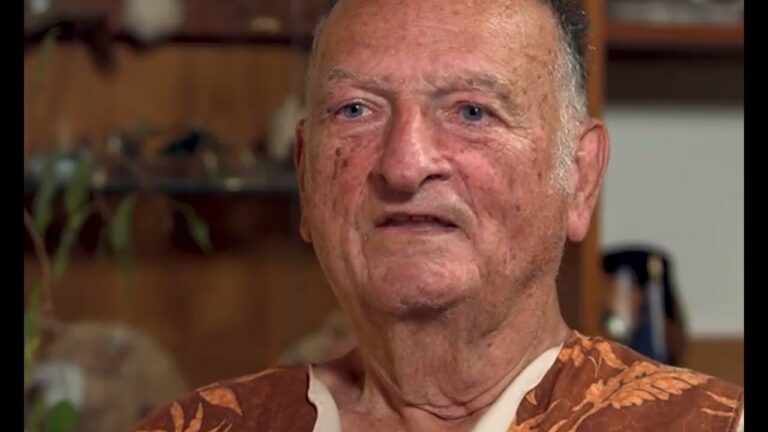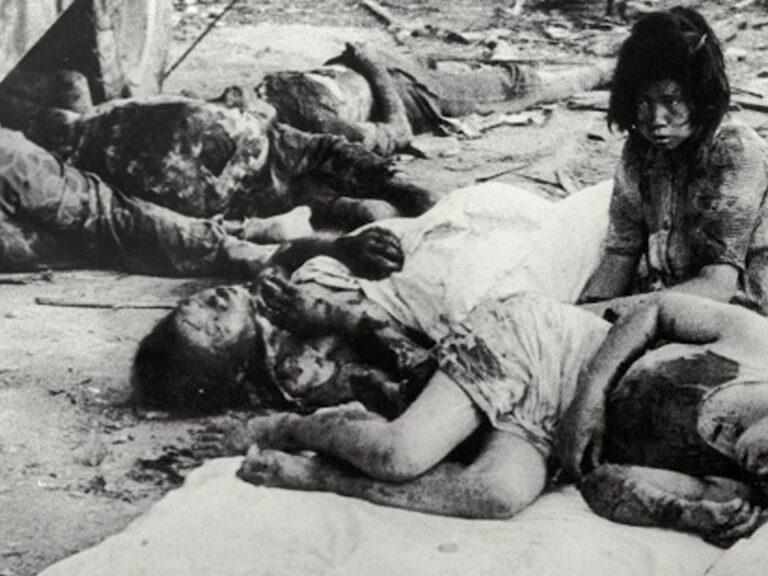Mr. Ratner tells Paul Jay that Gov. Rockefeller ordered the 1971 massacre of rebelling black prisoners to send a message throughout the US prison system. This is an episode of Reality Asserts Itself, produced March 10, 2014 with Paul Jay.
STORY TRANSCRIPT
PAUL JAY, SENIOR EDITOR, TRNN: Welcome back to The Real News Network. I’m Paul Jay in Baltimore, and we’re continuing our series of Reality Asserts Itself interviews with lawyer–I should say, radical human rights lawyer Michael Ratner, who now joins us in the studio.
Thanks for joining us again, Michael.
MICHAEL RATNER, PRESIDENT EMERITUS, CENTER FOR CONSTITUTIONAL RIGHTS: Nice to be back with you, Paul.
JAY: And just another–one more time, Michael is president emeritus at the Center for Constitutional Rights in New York. He’s chair of the European Center for Constitutional and Human Rights in Berlin. He’s also a member of the board of The Real News Network. And all kinds of other stuff.
Let’s pick up the story in 1971. You’ve just gone through this decade which is–revolutionary is the only way to describe the 1960s all over the world, and nobody knew where this was all going to lead. But in 1971, one of the seminal events, I think, was prison uprisings. There were several, actually, including one in Quebec around the same time. But the best-known was Attica, and you became involved in that.
RATNER: You know, after I clerked for Constance Baker Motley, the only woman black federal judge, I took a job at the Center for Constitutional Rights–newly formed, came out of the southern civil rights movement, giants of the civil rights movement–William Kunstler, Arthur Kinoy, Morton Stavis. Giants. And they were the front lines, really, of the civil rights movement and of defending–really, defending what we’re calling the revolution that happened in the ’60s. And part of that included the Chicago Seven or Eight case, the one about the protests at the Democratic convention. They had a whole section defending Vietnam War resisters, soldiers, and others.
So it was an incredibly amazing place to be. Tiny. You know, a dozen of us there, maybe that, in a loft off, like, the worst porn district in New York, 42nd Street. Very–not a lot of money. But an exhilarating place to go. And despite where one could go at that point coming off a clerkship and all that, I decided to go to the Center, because this is the kind of work I wanted to do.
So I walk into the office, which isn’t really–no one has separate offices. It’s little dividers. It’s linoleum floor. It’s up a loft. And I’m there really literally three or four days. It’s September 1971. And during that period, Bill Kunstler is up at Attica, where there has been a takeover of what’s called D Yard in the prison, and there’s hundreds of prisoners who’ve taken over D Yard. And Bill Kunstler is part of the negotiating committee to try and figure out with the state to negotiate how this is going to come to an end. Tom Wicker was there, the New York Times reporter; Herman Badillo, a politician from New York. A prominent set of negotiators.
And [incompr.] remember Attica. I don’t remember the numbers, but thousands of prisoners, 90-some percent black and Latino. I think zero is the number of black or Latino guards–all white. So you’re talking about, I mean, just deep, deep discrimination, both in the population as well as how it’s being guarded. And there were huge, legitimate complaints. I mean, Attica looks like a medieval fortress, and it probably was like that inside. So there’s the Attica prison has had this takeover, and as you said, there were many prison riots or rebellions is what we call Attica, Attica rebellion, going on across the country, and even in Canada and other places. And Bill is the negotiator.
And then finally the negotiations really break down, most likely over the amnesty issue, but perhaps some other issues. One prison guard, as I recall, had been killed. I don’t know the circumstances. In fact, no one was ever convicted of his murder in the end. But one prison guard was killed. And the state was run by Nelson Rockefeller–was the governor. We now call him “the Butcher of Attica”–and then he’s dead, but I still call him that. And then on, I guess, it’s September 11, actually, I think, is the day–the same day as the coup in Chile two years later–and September 11, could it be 9/11 also? It’s conceivable. I think they were all then–I don’t remember the exact day for Attica, but I think September 11. They say that the negotiatiors can’t go in any longer to negotiate with the prisoners and talk to them, and there’s a picture of Bill walking out saying, I just fear the absolute worst.
JAY: Bill Kunstler.
RATNER: Bill Kunstler coming out, I–say, I fear the absolute worst. And what happens: you see in film shot of the National Guard who have been called with their big guns to line the walls, you see them raising their fists and their guns, “white power, white power”. This is the people who were going to supposedly put down–.
JAY: They actually start chanting “white power”.
RATNER: Yeah. We’re going to put down the Attica Prison rebellion. And what happens is a massacre. They fire into–mostly arbitrarily just into the yard, killing–I think it’s 32 people and nine guards or–I don’t remember the exact numbers. But they also target some of the more politically active people and kill them. So it’s murder, straight, straight murder.
And then the report that’s put out in the press is they had to do it because the guards–I mean, the prisoners were killing people and they were killing the guards and were castrating the guards.
~~~
NEWS PRESENTER: Good evening. Before the four day insurrection of New York’s Attica State Prison came to a tragic end this morning. Negotiations gave way to force, making this the bloodiest prison incident the country has seen in four decades.
NEWS PRESENTER: In the final hours of the revolt, led primarily by blacks, the inmates murdered nine of their white hostages. Twenty-eight convicts were killed by state troopers and sheriffs’ deputies, who regained control of the prison.
~~~
RATNER: I’m sitting with my partner at the time, Margie Ratner, who’s later Margie Ratner-Kunstler, but she’s a lawyer I work with, and we say to each other, this is complete BS. I don’t believe anything we’re reading. But that was the dominant narrative for over a month, that guards were castrated by the prisoners.
JAY: And it turned out not to be true.
RATNER: Completely false. Nothing to do with it at all. No guards were killed in that except–the only guards that were killed by that were by the bullets of the National Guard and Rockefeller ordering it. There’s a great–it’s a Tom Paxton song, Judy Collins sang it, and it’s from the point of view of a prison guard who’s taken hostage, and they’re being shot. And he says–and they’re talking to each other, and he says, you know, first they say, don’t worry, they’re going to free us, and then he says the shots start coming, and they sing, had they only taken Rockefeller hostage, then they actually might have done something to solve this thing. But working-class guards are essentially dispensable, like the prisoners.
So I’m there, I’m at the Center. We’re monitoring the situation ’cause Bill is our–you know, one of our leaders at the Center, Bill Kunstler is. And they immediately send a group of us up to Attica right after the rebellion is put down. And my job is to go into the prison hospital and interview people who’ve been tortured and beaten, because after they retook the prison, they forced all the prisoners to run through a gauntlet of guards naked–the guards weren’t naked; I mean the prisoners were naked–and they were just beaten. They had to do it on glass. All kinds of really bad stuff. And, you know, I don’t actually have a lot of memory of being in that hospital room, but it was a large room, you know, maybe, you know, 100 feet by 50 feet, and it was very large, with scores of people in their beds in all kinds of terrible shape, having been tortured and brutalized by the guards. And my job was to interview them to get evidence about what happened to them.
JAY: And what had been their demands?
RATNER: Everything from better food, exercise, demands that are–.
JAY: They were simple reforms.
RATNER: Right, that would be similar to most prisoners’ requests and demands today, because very little has changed. So, exactly right. Simple, very simple reforms.
JAY: And it was put down with such violence because–?
RATNER: You know, I think–I don’t know what was in Rockefeller’s mind, but I think they didn’t consider prisoners to be human, and so they figured they’re just dispensable, they’re all criminals; and secondly, probably ’cause they wanted to send a lesson. You know, New York had a lot of prisoners. I mean, I thought it was a lot of prisoners then. Of course, the country now has, like, six times the number of prisoners we had in 1970. I think there were 600,000 in the country. Now there’s two and a half million. So–or five times the number, but whatever. There were a lot of prisoners. And so they wanted to send a message: you rebel, you will be murdered. I think that’s just clear.
And what’s interesting is they then–. Anyway, we were told to interview the prisoners, and we brought–there were various lawsuits for conditions and what happened to them. And my instructions were–I was a new lawyer–was do not ask them anything about what happened before the massacres, because [incompr.] going to be criminal cases. And ultimately there were a huge number of criminal cases brought by the state against the prisoners. Huge. I mean, for murder, everything. Hundreds of cases. And there was a big defense team–I was not part of that, but that was the National Lawyers Guild and the Center and others to defend those people. And we brought–I brought a suit to say, this is unfair. You have to–to be justice here, you have to go after the National Guard. They threw me out on that basis, but ultimately that’s what prevailed; ultimately it became so obvious that the National Guard had just caused massive death and there was no looking at what they were doing–and some of the prosecutors started to resign, actually–that the entire cases fell.
JAY: Against the prisoners.
RATNER: Against the prisoners. None. Zero. And eventually, after many years of litigation by a woman named Liz Fink and others, there was compensation paid to a number of the prisoners. It took 25 years.
JAY: Any National Guard or, more importantly, people that gave orders to the National Guard ever held accountable?
RATNER: No, never. That’s not something that would ever happen. And, of course, now we have a park by my house called Rockefeller Park, and it’s [incompr.] I want them to get stickers made that say, you know, “Butcher of Attica”, but for me personally, of course, because for me personally, you know, it was devastating to see it. I mean, Bill was shaken, Bill Kunstler was shaken more than probably anyone because he was in there with negotiations, but all of us who went up and became personal friends with prisoners were just shaken by the thing, by the death, by the cruelty of it, by the inhumanity of it, and by prisons in general.
In one instance from it, we once took one of the prisoners who’d gotten out upstate with us and to a farm or something, and we were using a chainsaw to cut wood. And he said, oh, can I try that? He’s probably a 35-year-old prisoner. And we give him the chainsaw, and he pulls the trigger back all the way, and the chainsaw jumps out of his hand because the person–he’s 35, he had never in his life used a power tool. He’d been in juvenile detention and prisons his whole life and never been trained even to use a power tool. And those kind of stories. I mean, it just wants to–it makes you want to just cry. I mean, that’s all I can say about it.
JAY: By this time you’re fairly radicalized, but this must have taken you another step.
RATNER: Oh, yeah. I mean, this was really–I mean, this you saw–I mean, look it, I’d seen the South, I’d seen segregated schools, I’d seen all that. But to be in a prison where that kind of massacre and slaughter and abuse and torture had happened, and to happen right in New York, and a, quote, northern state, it was astounding to see that.
But at that time in the office, everything’s happening. There’s–Vietnam is still going on, so there’s all the people resisting going into Vietnam. I represented people who were doing fragging, you know, rolling their grenades into the second lieutenant’s tent. And, you know, we did pretty well in those cases. I mean, you know, there was a huge amount going on. There was warrantless–.
JAY: Yeah, for people who don’t know, this fragging became a fairly common thing in Vietnam, where privates would throw grenades into their officers’ tents.
RATNER: And, you know, you–and they didn’t–they oftentimes didn’t get accused, convicted of murder or life sentences.
JAY: Because?
RATNER: I just think it was so brutal, the whole war, and they said people just lost it, and they just–they were given ten years or five years or something, but often–. And then there was–of course, the National Lawyers Guild and others were running coffee shops all over the country, at military bases, to recruit people. So Vietnam was still very heavy in 1971 and 1972, very heavy, as well as the remnants of the civil rights movement.
It was also the beginning, in New York–which was a big part of my activism–of the Puerto Rican liberation movement–not the beginning. For me it was the beginning. It had been going on forever. But to get Puerto Rico free from, you know, the U.S. And I got very involved in the Puerto Rican movement, starting in the early ’70s. I was–although I never joined a political party, I was very close to the Puerto Rican Socialist Party at that point, represented everybody from Vieques demonstrators to Puerto Rican draft resisters who refused to go in because, they said, we’re Puerto Rican, we’re independent, we don’t even have a right to vote. And it became–in New York, at least, a thrust of a radical part of our movement was led by the Puerto Rican independence movement.
JAY: Okay. We’re going to continue our series of interviews with Michael Ratner on Reality Asserts Itself on The Real News Network.






